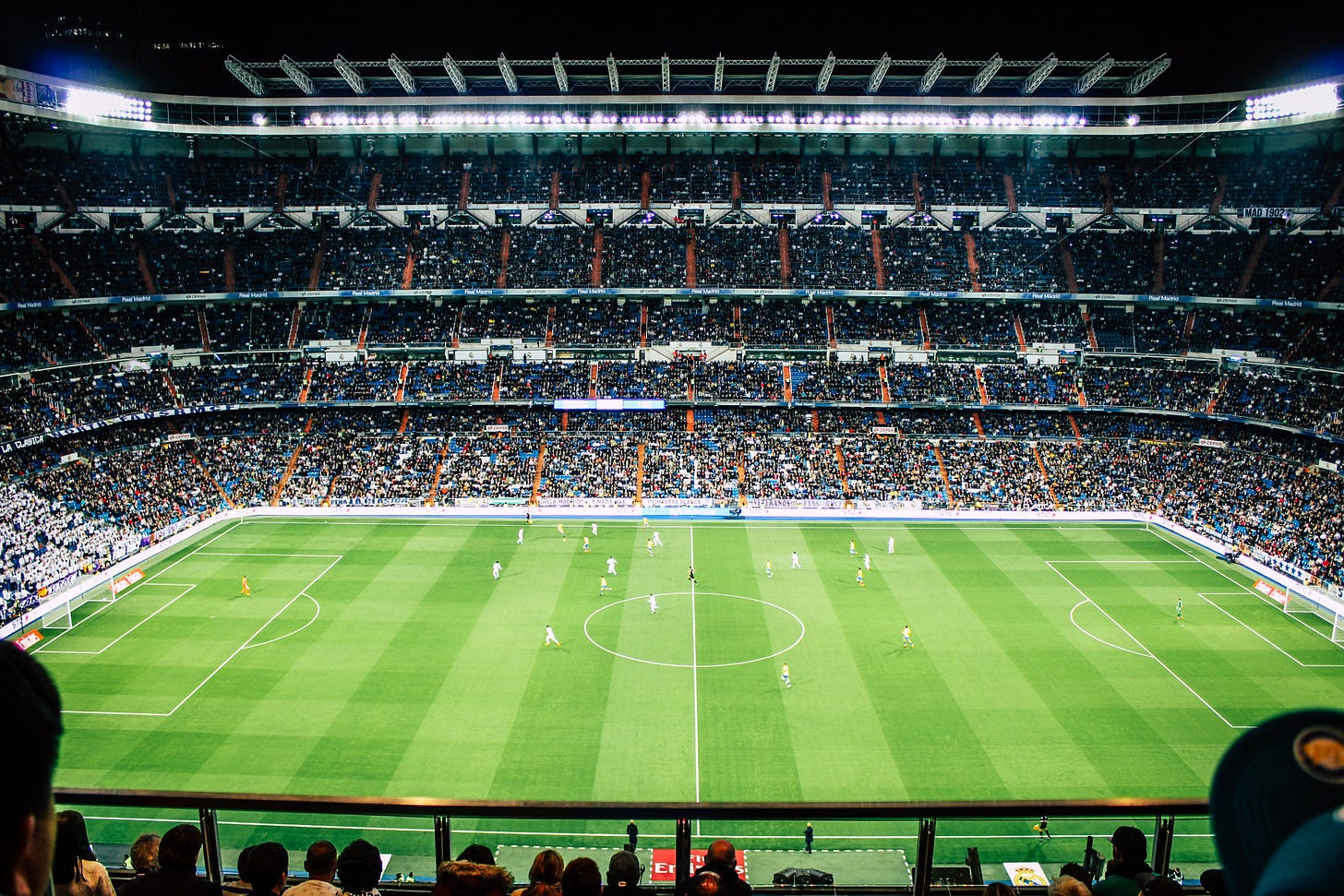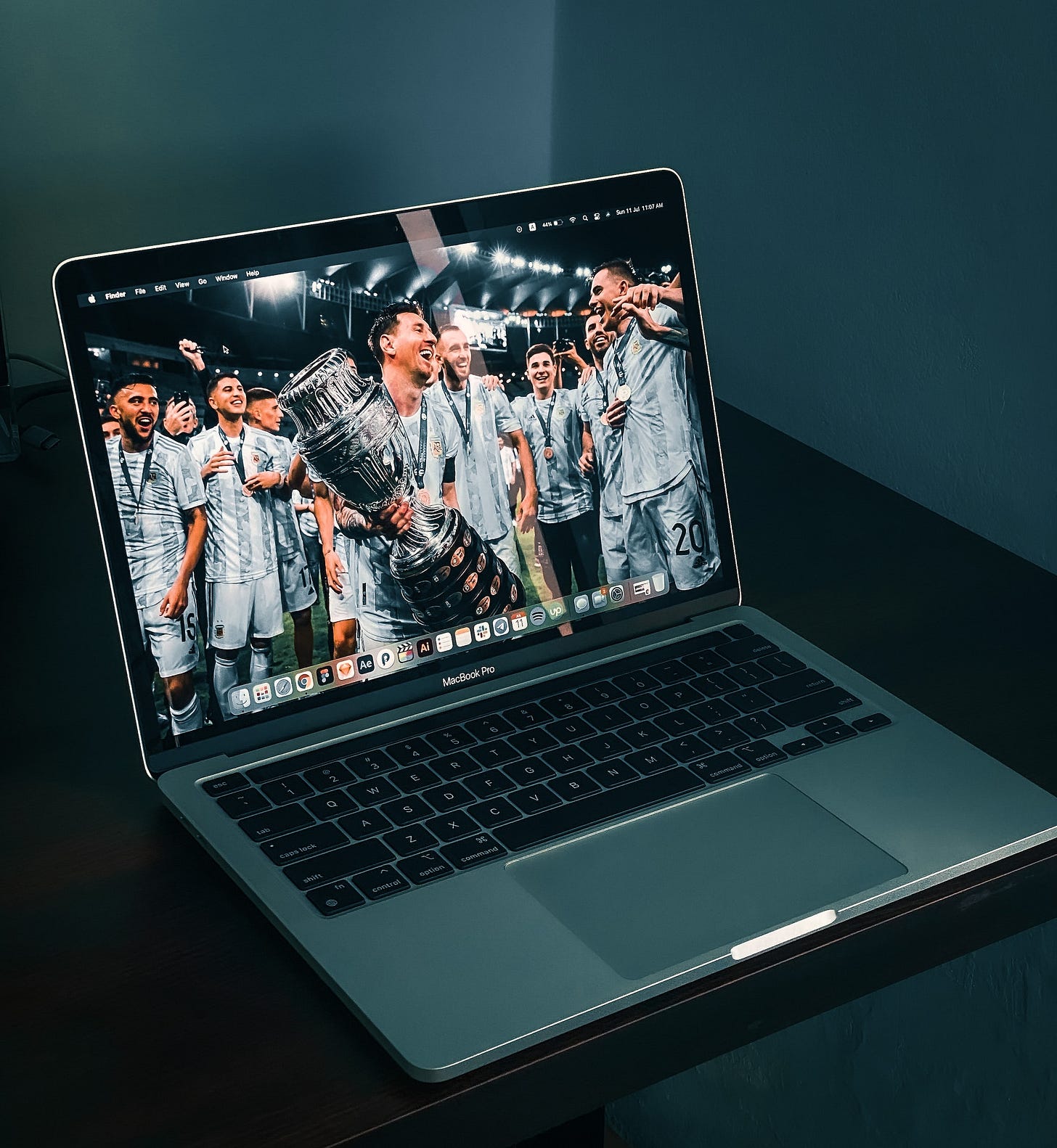Yes M.A.M. (Messi, Apple, MLS)
If you’re like me, your connection to the sport of soccer might be limited to:
Being dubbed “thunder foot” in 2nd grade
Playing way too much FIFA on Xbox in college
Loving the World Cup (and wishing the US men would catch-up to the US women)
But despite my lack of contribution, the sport is growing again in the US. Look at the uptick in popularity since 2010:

Not knowing this rebound was happening, I was shocked when Messi signed-up to play in Miami. Why? Well… two reasons. First, Messi is incredible – the clickbait drew me in like a moth to a flame. And second, it was only while reading about the Messi deal that I found out about another deal… Apple had acquired exclusive rights to live stream all the MLS games from 2023-2032.
That’s right – all 34 games. All 29 MLS clubs (986 total games per season). For 10 years. Holy monopoly batman. But the most surprising part is the price they paid. Before I let you guess the price for the 10-year deal, let me share a relevant comp – Amazon paid $11B for an 11-year deal to live stream the NFL’s Thursday Night Football (17 total games per season).
Ok, what’s your guess?
Let’s think out loud and do some very bad, hand-wavy math.
First let’s make sure we’re comparing a similar number of games. 986 is 58x more than 17, so multiply Amazon’s $11B pricetag by 58 and you get a staggering $638B.
Composing ourselves and sitting back in our chairs, we should now adjust for the sport’s popularity. A recent Gallup poll pointed to football being 5x more popular. Dividing the $638B by 5, we get ~$128B.
Finally, the MLS-Apple deal is for 10 years not 11, so we adjust the total down to $116B.
If you were to guess something close to that, you’d be wrong.
Apple will pay $2.5B over 10 years, which is an absolute steal. But it’s good for the league too – their prior distribution deal averaged ~$90M per year.
So this is priced as a win-win… but does that mean it’s good for Apple strategically?
Pros and Cons

(Pro) Sports drama is easier than scripted drama
Let’s hold off on accusations that sports are in any way scripted (cough, NFL refs this year). The truth is that creating scripted content consumers love is hard. Especially if you want to have a long-running, multi-season show. You have to run pilots, gauge audience reactions, and deal with higher costs over time. Actors will strike and demand more pay, viewers will complain about fake-looking dragons, etc. – all of which drives up costs. And it’s a vicious cycle you can’t escape. To quote my July 2023 post about the streaming wars:
So you’ve already spent a ton… why not stop? Essentially, it’s a prisoner’s dilemma. If you stop spending, content-spoiled customers will churn away from you and go to your competitors. So you keep spending, hoping your competitors are more chicken than you are.
The other difficult part of scripted content is that you have to try to predict what’s going to play well. Sometimes you catch lightning in a bottle, but it’s hard and audiences are fickle.
So how do you overcome those challenges with scripted content? You do live sports content instead. Apple is paying a fixed contract for 10 years to lock-in costs, and they’re not doing any risky taste-making. They’re just riding the wave of soccer popularity in the US. Sure there’s a risk that the growth won’t continue, but it’s not that much riskier than spending millions on production and advertising in the hopes of stumbling upon the next Seinfeld.
(Con) Wheelhouses matter
The biggest risk here is that this doesn’t fit squarely into Apple’s wheelhouse. Like we discussed when Apple unveiled their Vision Pro, Apple’s super powers are around design, hardware, and supply chain optimization. This new venture is a different beast.
Tech firms can reinvent themselves, as I argued in Change is Hard, but it takes time and it’s difficult at first. Apple has already hit some bumps in the road since the MLS season started in February. Here’s a scathing review of Apple’s MLS coverage from soccer journalist Peter Andrews back in April:
“Too often, the producers cut away to seemingly random shots of the crowd, or unnecessary closeups, or replays at exactly the wrong time…
The announcers have also been hit-and-miss…the quality of the commentary fluctuates wildly, with some teams either totally unfamiliar with both teams or clearly more familiar with the team they used to cover…
And the league has even fallen short on the most important thing — keeping the service going during the five hours per week that the games are going on. Season Pass crashed in the middle of the broadcast window this past weekend, cutting fans off from their games at the most inopportune time. These things happen, but it’s still a deeply frustrating experience…”
Ouch.
(Pro) Tim Cook definitely read Shoe Dog or watched Air

One final benefit to Apple’s approach here, and the part that brings this post full-circle, is that Tim Cook is taking notes from Phil Knight and Nike. To help grow demand for Apple’s newest product, they are partnering with a legend, and cutting them in on the deal. Just like Phil Knight hitched his horse to Michael Jordan (one of the most successful partnerships in history), Tim Cook is counting on Messi. And making it worth Messi’s time.
We don’t have public details to dig-through and do very bad, hand-wavy math on, but Apple committed to a revenue share agreement with Messi. Based on the deal, he’ll get paid for driving new subscribers to Apple.
So based on early data, is he performing for Apple?
Well, the three most-watched MLS matches of all time happened during Messi’s first week. And in his first game, he came in as a substitute, scored a free kick, and won Miami the game. So yeah, you could say he’s performing.
Wrapping up
Taken together, I think the pros outweigh the cons, and I’m pretty comfortable saying Apple will smooth out the kinks and help grow the sport. And even beyond Apple, I’d be surprised if we don’t see other combatants in the streaming wars look to live programming – especially sports – as a way of surviving longer and subsidizing scripted content.
Should be fun to watch.
Bonus Bullets
Quote of the Week:
“There is no right investment philosophy, but there’s one that’s right for you. And to find that philosophy, the person you’ve got to understand is…. you. Not Warren Buffett. Not Peter Lynch. Spend less time reading about other successful investors. Spend more time looking inward at the things that make you comfortable and uncomfortable.”
— Aswath Damodaran, NYU Finance Professor
Quick News Reactions:
Okta hacked!? – The identity and access giant, protector of the realm, mother of dragons… got hacked. Not good for the brand. The company said the breach affects 1% of customers (~100K+ users).
Twitter tier-a-palooza – In the last week, Elon announced not one, not two, but THREE new paid tiers on X. Daily active users are down 13% from a year ago, and Elon and X continue to thrash wildly about while treading water…
Meta outdoes itself – I’ve said it before, but this is bold and I don’t hate it. Meta’s Q3 operating losses in the Reality Labs unit were up 2% from the same period last year. $3.9 billion…
Cruise (out of) Control – I’ll be honest, I’m disappointed that San Francisco has suspended the self-driving service. But I do understand that the path to public comfort with new tech like this (and the performance of that tech) will have ups and downs.
Pay Later Alligator – Apple launched their buy-now-pay-later (BNPL) option. I’m not a fan of BNPL (penalties for missing payments are really steep, and you don’t build credit since it’s not linked with the credit bureaus). For Apple, which has played-up its customer trust angle (security, privacy, etc), this feels like a strategic miss.


